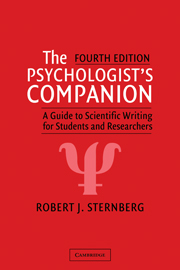Book contents
- Frontmatter
- Contents
- Acknowledgments
- Introduction
- 1 Eight Common Misconceptions about Psychology Papers
- 2 Steps in Writing the Library Research Paper
- 3 Steps in Writing the Experimental Research Paper
- 4 Rules for Writing the Psychology Paper
- 5 Using the Internet to Aid the Research Process
- 6 Commonly Misused Words
- 7 American Psychological Association Guidelines for Psychology Papers
- 8 Guidelines for Data Presentation
- 9 References for the Psychology Paper
- 10 Standards for Evaluating the Psychology Paper
- 11 Submitting a Paper to a Journal
- 12 How to Win Acceptances from Psychology Journals: Twenty-Nine Tips for Better Writing
- 13 Writing a Grant or Contract Proposal
- 14 How to Find a Book Publisher
- 15 Writing a Lecture
- 16 Article Writing 101
- References
- Appendix A Sample Psychology Paper
- Appendix B Writing for British and European Journals
- Index
13 - Writing a Grant or Contract Proposal
Published online by Cambridge University Press: 05 June 2012
- Frontmatter
- Contents
- Acknowledgments
- Introduction
- 1 Eight Common Misconceptions about Psychology Papers
- 2 Steps in Writing the Library Research Paper
- 3 Steps in Writing the Experimental Research Paper
- 4 Rules for Writing the Psychology Paper
- 5 Using the Internet to Aid the Research Process
- 6 Commonly Misused Words
- 7 American Psychological Association Guidelines for Psychology Papers
- 8 Guidelines for Data Presentation
- 9 References for the Psychology Paper
- 10 Standards for Evaluating the Psychology Paper
- 11 Submitting a Paper to a Journal
- 12 How to Win Acceptances from Psychology Journals: Twenty-Nine Tips for Better Writing
- 13 Writing a Grant or Contract Proposal
- 14 How to Find a Book Publisher
- 15 Writing a Lecture
- 16 Article Writing 101
- References
- Appendix A Sample Psychology Paper
- Appendix B Writing for British and European Journals
- Index
Summary
My first grant proposal was a horror story: It was long, verbose, and poorly organized. Fortunately for me, in 1975 one could write a grant proposal that had all of these flaws, plus others, and still get funded. I did. But in the 1990s, I probably wouldn't have had a prayer and would have had to rewrite the whole thing. In 1975, the competition for grants was stiff; in the 1990s, it was close to ridiculous. Only the very best proposals even have a chance of success, and many that meet all of the scientific criteria for funding are not funded, simply for a lack of money. Therefore, it is important to know how to write a grant proposal in order to maximize your chances of getting funded. In this chapter, I will describe some basics of proposals, some keys to writing good proposals, and some things that agencies look for in making funding decisions.
Different funding organizations have different guidelines for writing proposals. There would be no sense in consuming space in this book describing the requirements of various organizations; there are too many organizations and requirements, and the requirements are constantly changing. Rather, I will describe 18 keys to writing a good proposal. Paying attention to these keys does not ensure that you will be funded, but they will surely help!
- Type
- Chapter
- Information
- The Psychologist's CompanionA Guide to Scientific Writing for Students and Researchers, pp. 232 - 243Publisher: Cambridge University PressPrint publication year: 2003



